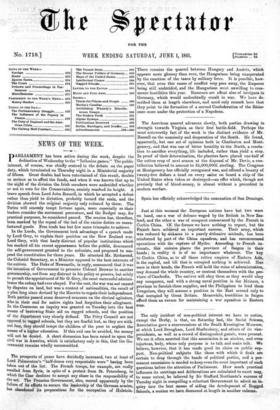NEWS OF THE WEEK
PARLIAMENT has been active during the week, despite the dedication of Wednesday to the " Isthmian games." The public interest, of course, was chiefly centred in the debate on the paper duty, which terminated on Thursday night in a Ministerial majority of fifteen. Great doubts had been entertained of this result, doubts so serious as to affect the funds, and when it was known that up to the night of the division the Irish members were undecided whether or not to vote for the Conservatives, anxiety readied its height. A brave speech from Lord John Russell, in which lie accepted a defeat rather than yield to dictation, probably turned the scale, and the division showed the original majority only reduced by three. The Tories will scarcely tempt fortune again, more especially as their leaders consider the movement premature, and the Budget may, for practical purposes, be considered passed. The session has, therefore, been marked by the repeal of the last of the excise duties on manu- factured goods. Free trade has but few more triumphs to achieve.
In the Lords, the Government took advantage of a speech made by Lord Grey, to explain their position on the New Zealand war. Lord Grey, with that hasty distrust of popular institutions which has marked all his recent appearances before the public, denounced the self-government granted to the colonists, and proposed to sus- pend the constitution for three years. He attacked Mr. Richmond, the Colonial Secretary, as a Minister opposed to the best interests of the natives. The Duke of Newcastle, in reply, announced that it was the intention of Government to promote Colonel Browne to another governorship, not from any distrust in his policy or powers, but solely to permit the appointment of Sir G. Grey, the most successful adminis- trator the colony had ever obeyed. For the rest, the war was not caused by disputes on land, but was a contest of nationalities, the result of a plan long since devised by the Maories to regain their independence. Both parties passed some deserved censures on the clerical agitators, who in their zeal for native rights had forgotten their allegiance. In the Commons an inquiry was granted on Tuesday into the best means of bestowing State aid on ragged schools, and the position of the department very clearly defined. The Privy Council are not opposed to ragged schools, but they are fearful lest, as they are with- out fees, they should tempt the children of the poor to neglect the means of a higher education. If this evil can be avoided, the money will not be denied. A short discussion has been raised in upon the civil war in America, which is satisfactory only in this, that the Go- vernment remains wholly uncommitted.






























